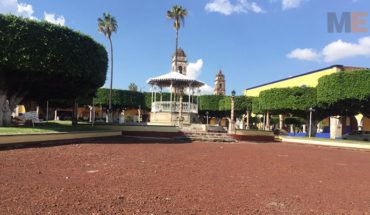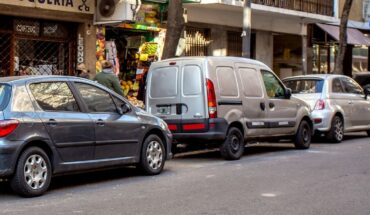a 17 years old Rocio was married to a man with whom he had three children and then emigrated to California in search of a well-paid job.
The time and distance did not play in favor of marriage which, in 2008, decided to end their relationship.
Dew, a native of Guanajuato, continued dedicated to the upbringing of their children until seven years later, she met Edward. The month of February 2015 they began to run. The thirties thought he had found his life companion and that their children might be found a father figure in her new partner. Therefore agreed to this will be installed in the building in Irapuato that his parents had left him in charge, when they also decided to emigrate to the United States.
The family house where Rocío thought gave home a better chapter in his life turned into a hell. Soon discovered that she and her children had fallen into the clutches of a “huachicolero”: a man linked to the business of fuel theft.
“It forced me to accompany him, to load and deliver the gasoline. In my house all day was loaded and unloaded. “Over time I realized that I didn’t, he wanted was a closer place where were the shots”.
The former is the complaint that this Mexican mother is doing in the State of California. The United States Government is requesting political asylum to safeguard their lives and those of their children.
On December 13, in federal court in Los Angeles, California, will start the trial in which Rocío Campos be exposed before a migration judge their reasons for requesting asylum. Their future hangs in the balance of the decision of this Court.
This Mexican mother has abandoned Guanajuato since violence in the land where he was born has soared to alarming levels.
In fact, Wednesday 5 December during his morning Conference at the National Palace, President Andrés Manuel López Obrador announced that his Government will present a strategy to combat crime. “In the case of Guanajuato, there is a link in the theft of fuels [con la alta incidencia de homicidios] and soon we are going to publicize a plan on this subject,” he said.
From California, Yvette Gutiérrez, the lawyer of Rocío Campos, explains that “the Mrs. fields came fleeing from your partner. Not brought anything with it, more than the most valuable: their children. She suffered a very serious injury in his country: his family hurt her physically and emotionally both her and their children. She could not go to the [en México] authorities by the very fact of being partner of a person involved in clandestine operations. If she returned to their country, their lives and their children are at risk”, alert.
The hardest thing for this Mexican, says lawyer graduated from the University of California, is the criterion of the current US authorities, because “we have an administration that has openly told everyone that he does not want migrants and” particularly in certain countries”.
And to make matters worse, he adds, “in June 2018 the Prosecutor General of United States. UU. (US Attorney General) decided to remove the protection to people who have experienced domestic violence in their countries by a couple”.
Such a criterion, regrets the expert on immigration issues, “not only affects to the Mrs. fields, but thousands of people who today are in a trial of immigration or in process”.
Over time always against Rocío Campos seeks to know the hell that happened, despite the risk posed by his revelations, because it says that it is the only way to safeguard the lives of his family.
“I came fleeing my country with my children because I fear for my life at the hands of my fellow”, he says in an exclusive interview with Newsweek Mexico. This is his story.
LAND of BRACEROS in CORRIDOR of HUACHICOLEROS Guanajuato is one of the States with greater migration flows towards the United States from those years of war in which the need for labor made that foremen offered the braceros work visas and good wages.
Much of this Mexican State’s economy has benefited from remittances from men of every family that just reaching the age of majority, they left for “the other side”, to be used in the farm fields of California, Arizona farmers or the construction in Florida.
However, as they tightened the immigration provisions in the United States, and the economy and the world changed, Guanajuato also changed. Its refinery in Salamanca and its hydrocarbon storage centres many people began to get involved in an activity that is colloquially called the “huachicol”. This activity refers to refined evade and conceal the missing with other substances.
This form of theft has become a dangerous corridor to the Mexican Bajio zone.
Only in 2018 the theft of fuel via clandestine tomas has reached record numbers. Reports daily, there are, on average, more than 40 clandestine outlets. According to Pemex, 11,240 clandestine outlets were counted from January to September of this year. Guanajuato is the State where more has been elevated this illicit and crime rates.
The fuel stolen from Pemex became the main spoils of the drug cartels, who star in violent dispute for control of the pipelines, the sale and distribution, to the pair of drug distribution.
In the 17 readily municipalities where there are networks of pipelines, entire communities live steal fuel.
In Salamanca, Irapuato, Apaseo el Alto, Celaya, Valle Santiago Romita, Apaseo el Grande, Comonfort, Villagrán and others became common to see men sucking ducts. It was said that the tubes were not “nobody”, but who punched them.
The huachicol business was largely in the hands of employees of the oil industry, knowing how and where to drill, and who sell the extracted, including official stations.
But the drug cartels entered into illegal business in the first decade of the century. It was so lucrative, that violent disputes that now occur are by the ‘black gold’: control of underground ducts and Thomas, the routes of transfer and sale.
The municipalities of Guanajuato where there are several pipelines of ‘black gold’, came a day the Cartel’s Jalisco new generation (CJNG) men. This criminal group, which emerged as the armed wing of the Sinaloa Cartel (the so-called Mata Zetas), according to reports by U.S. and Mexican authorities, won a brutal power.
They arrived in heavily armed commands and informed the locals that, from that moment, “tubes” already had owner.
The warning was accompanied by the offer of work for them: win 500 pesos per day for loading and unloading gasoline and 6,000 pesos a month for those who fungieran as “Hawks”. These “deals” would have been attractive to those who earn 100 pesos daily for one day of ‘legal’ employment.
All this happens in an environment where, only 26 per cent of the population over 12 years old is busy work (44 per cent are men and 10 per cent are women, according to the Inegi).
The news came to Santa Barbara, where there are about 792 people and 216 houses; its inhabitants face many shortcomings, a high level of illiteracy and various social lags. On the rancheria was born Rocío Campos 38 years ago, in a family of seven brothers who, like most, survived in remittances that his father sent from United States.
FROM heaven to hell the family house where Rocío thought a better stage would start in his life is located in a spacious, three plots of land, and has a wide front door and rear output. A feature that makes it especially quoted is that it is close to a pipeline of fuel in the town of Santa Barbara, municipality of Irapuato.
The first days with Eduardo were gentle, until it began to receive the visit of “strangers”, as described in the Guanajuato.
Visits grew recurring and when she questioned him who they were, he was limited to tell him it was friends or cousins who came to greet him.
Soon after, Eduardo started to make modifications in the familiar ground: changed the backyard; He dug and ordered to put a water tank of 10,000 liters, hoses, cans, bottles and racks. Your partner went out at night and returning with trucks that he and other men used to transport the fuel secretly taking from Pemex pipeline.
When dew claimed Edward was doing, he replied in a way violent. Boasting of his role as head of the family, he ordered their children do all what they asked.
Also part of their illegal activities made to spray.
One night I told her that I should accompany him in their night barrel of huachicol as, said, “when you take a woman you not review”. He used it as a facade so that he and his men evading the occasional road controls.
Then came the glass. Eduardo was also in charge of distributing the drug cartel to wrongfully in the city of Irapuato.
The House where they lived, day and night entered and left loads of gasoline. It is distributed to individuals, and in all the municipality and some nearby, as well as the drug business.
What happened in this rancheria of Santa Barbara was relatively normal for the people. Natural proved that those who docked before a train in these latitudes, then accepted work for the CJNG. Risks, on the other hand, seemed minor: the police did as he chased them, only asked to pay a fee. Rocío says that on more than one occasion he had to deliver the money that police officers were paid to the huachicoleros.
His life wore in a hell of capsizing product business of the huachicol, the sale of drugs and theft and marketing of cars of your partner. “This was so frustrating for me – says – it could not sleep or be quiet day or night”.
Newsweek Mexico reveals details its history and explains why it is so urgent that the United States Government granted asylum: “when I met him I felt very alone.” I didn’t know their business. You fall in love and it seems that all is well, but I what I was seeing with the passage of time was that he not I wanted to, he wanted was a local place where were the shots to be able to load. To put the trucks in my house and then remove them at night. I told him: ‘You don’t like me, don’t, have my kids here’. He answered: ‘Nothing happens’ “.”
And continues: “at the ranch was as if everything was normal, since many people were involved in those illegal things, but the police pursued them or Pemex [los agentes de seguridad, en su mayoría militares que forman parte de la Gerencia de Servicios de Seguridad Física de Pemex];” but this – stresses – began to grow with other posters”.
He says that many times he thought of denouncing it. “But before whom? If the own policemen arrived to pick up its share”, says.
Summarizes it his terror and helplessness before what became his everyday life: “My House became a place where trucks came and went loaded with gasoline. The only police would turn the money, how could report it if they were complicit? This also was with the soldiers. Meanwhile, involved my son to sell Crystal, something that I didn’t want that drug.
“The new generation [CJNG] controlled drugs and the huachicol and ask you to kill anyone who is not part of them.” For all this already he couldn’t sleep because now my son was involved. We were terrified. Eduardo did not care to nothing more than making money, I have no idea where to put it, but it did not give me anything. When I told him that I would go with my children threatened me: ‘they won’t go anywhere because I will look for them and you and your children will suffer the consequences’ “.”
Read the full story at Newsweek Mexico
translated from Spanish: Who is Rocío Campos and why asks haven to us?
December 9, 2018 |





